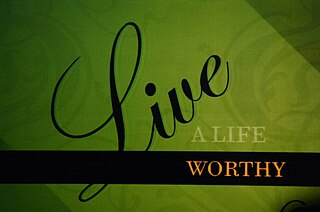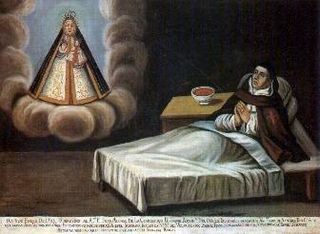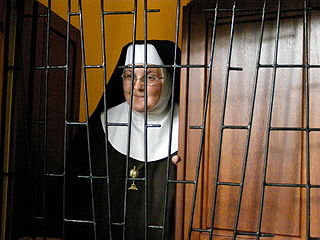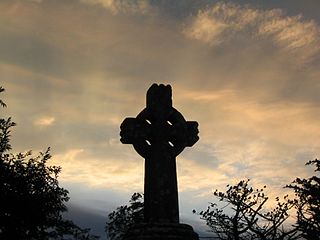
Celibacy is the state of voluntarily being unmarried, sexually abstinent, or both, usually for religious reasons. It is often in association with the role of a religious official or devotee. In its narrow sense, the term celibacy is applied only to those for whom the unmarried state is the result of a sacred vow, act of renunciation, or religious conviction. In a wider sense, it is commonly understood to only mean abstinence from sexual activity.

Monasticism or monkhood is a religious way of life in which one renounces worldly pursuits to devote oneself fully to spiritual work. Monastic life plays an important role in many Christian churches, especially in the Catholic and Orthodox traditions. Similar forms of religious life also exist in other faiths, most notably in Buddhism, but also in Hinduism and Jainism, although the expressions differ considerably. By contrast, in other religions monasticism is criticized and not practiced, as in Islam and Zoroastrianism, or plays a marginal role, as in Judaism.

The Franciscans are a group of related mendicant religious orders within the Catholic Church, founded in 1209 by Saint Francis of Assisi. These orders include the Order of Friars Minor, the Order of Saint Clare, and the Third Order of Saint Francis. They adhere to the teachings and spiritual disciplines of the founder and of his main associates and followers, such as Clare of Assisi, Anthony of Padua, and Elizabeth of Hungary, among many others.

The term Augustinians, named after Augustine of Hippo (354–430), applies to two distinct types of Catholic religious orders, dating back to the first millennium but formally created in the 13th century, and some Anglican religious orders, created in the 19th century, though technically there is no "Order of St. Augustine" in Anglicanism. Within Anglicanism the Rule of St. Augustine is followed only by women, who form several different communities of Augustinian nuns in the Anglican Communion.

Urbana is a major Christian student missions conference sponsored by InterVarsity Christian Fellowship. The event is designed to inform Christian students about global issues and issues around the world that missionaries face. The conference also encourages students to explore the biblical mandate for cross-cultural missions and encourages them to participate in missions.

A monk is a person who practices religious asceticism by monastic living, either alone or with any number of other monks. A monk may be a person who decides to dedicate his life to serving all other living beings, or to be an ascetic who voluntarily chooses to leave mainstream society and live his or her life in prayer and contemplation. The concept is ancient and can be seen in many religions and in philosophy.
InterVarsity Christian Fellowship/USA is an inter-denominational, evangelical Christian campus ministry founded in 1941, working with students and faculty on U.S. college and university campuses. In the 2017–2018 school year, 1,326 campus staff members served 36,742 students and faculty in 1,025 chapters on 695 campuses in the United States. InterVarsity is a charter member of the International Fellowship of Evangelical Students, a network of similar campus ministries around the world.

Christian monasticism is the devotional practice of individuals who live ascetic and typically cloistered lives that are dedicated to Christian worship. It began to develop early in the history of the Christian Church, modeled upon scriptural examples and ideals, including those in the Old Testament, but not mandated as an institution in the scriptures. It has come to be regulated by religious rules and, in modern times, the Canon law of the respective Christian denominations that have forms of monastic living. Those living the monastic life are known by the generic terms monks (men) and nuns (women). The word monk originated from the Greek monachos "monk", itself from monos meaning "alone".

Mendicant orders are, primarily, certain Christian religious orders that have adopted a lifestyle of poverty, traveling, and living in urban areas for purposes of preaching, evangelization, and ministry, especially to the poor. At their foundation these orders rejected the previously established monastic model. This foresaw living in one stable, isolated community where members worked at a trade and owned property in common, including land, buildings and other wealth. By contrast, the mendicants avoided owning property at all, did not work at a trade, and embraced a poor, often itinerant lifestyle. They depended for their survival on the goodwill of the people to whom they preached.

Anglican religious orders are communities of men or women in the Anglican Communion who live under a common rule of life. The members of religious orders take vows which often include the traditional monastic vows of poverty, chastity and obedience, or the ancient vow of stability, or sometimes a modern interpretation of some or all of these vows. Members may be laity or clergy, but most commonly include a mixture of both. They lead a common life of work and prayer, sometimes on a single site, sometimes spread over multiple locations.

Enclosed religious orders of the Christian churches have solemn vows with a strict separation from the affairs of the external world. The term cloistered is synonymous with enclosed. In the Catholic Church enclosure is regulated by the code of canon law, either the Latin code or the Oriental code, and also by subsidiary legislation. It is practised with a variety of customs according to the nature and charism of the community in question.

Richard Thomas France, known as R. T. France or Dick France, was a New Testament scholar and Anglican cleric. He was Principal of Wycliffe Hall, Oxford, from 1989 to 1995. He also worked for the London School of Theology.
David Falconer Wells is Distinguished Senior Research Professor at Gordon-Conwell Theological Seminary. He is the author of several books in which his evangelical theology engages with the modern world. He has taught at Trinity Evangelical Divinity School and has served as the Academic Dean at Gordon-Conwell Theological Seminary's Charlotte, North Carolina campus.
Servants to Asia’s Urban Poor is an international network of Christian communities living and working in the slums of Asia and the West, participating with the poor to bring hope and justice through Jesus Christ.(See www.servantsasia.org). Servants is an organic movement, body, family and community, rather than a traditional mission organization, charity, or NGO.
Divine presence, presence of God, Inner God, or simply presence is a concept in religion, spirituality, and theology that deals with the ability of a god or gods to be "present" with human beings.
Gregory K. Beale is a biblical scholar, currently a Professor of New Testament and Biblical Theology at Westminster Theological Seminary. He is an ordained minister in the Orthodox Presbyterian Church. He has made a number of contributions to conservative Biblical hermeneutics, particularly in the area of the use of the Old Testament in the New Testament. He served as the president of the Evangelical Theological Society in 2004. In 2013, he was elected by Westminster Theological Seminary to be the first occupant of the J. Gresham Machen Chair of New Testament. At his inauguration he delivered an address titled The Cognitive Peripheral Vision of Biblical Writers.
The pre-existence of Christ asserts the existence of Christ before his incarnation as Jesus. One of the relevant Bible passages is John 1:1–18 where, in the Trinitarian interpretation, Christ is identified with a pre-existent divine hypostasis called the Logos or Word. There are nontrinitarian views that question the aspect of personal pre-existence or the aspect of divinity or both.
The Simple Way is an non-profit in Philadelphia, Pennsylvania, United States. Shane Claiborne and five other Eastern University graduates founded an intentional community when they moved into a terraced house in the neighborhood of Kensington in January 1998. They purposely started the community in the poorest area of the city, which was a place where there were no existing local churches. They did not apply for funding from mission agencies. Since then, the community has transitioned into a local non-profit. Current activities of The Simple Way include planting gardens, running a store, and working for food security in the neighborhood. When a law was passed that prohibited distribution of food on streets in the city, The Simple Way avoided breaking the new law by instead distributing the Eucharist, which is not considered food after it has been blessed. The community is part of the New Monasticism movement.
Kevin Giles is an Australian pastor and Theologian. He is an ordained evangelical Anglican who was in parish ministry for over forty years. He and his family live in Melbourne, Australia. Giles studied at Moore Theological College in Sydney, Durham University, England and Tubingen University, Germany. He has a Doctor of Theology degree from the Australian College of Theology.
















